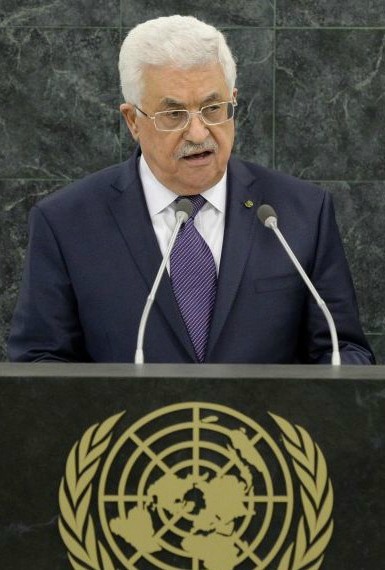“The decision of the Palestinians to take their case to the UN reflects, first and foremost, the loss of
credibility of the current peace process and their understandable conviction that as things stand today,
negotiations will never end the occupation or deliver statehood. Palestinian leaders, like leaders anywhere, need
to address the concerns of their people and provide them a tangible path forward. Their decision to take
their case to the UN also reflects the recognition that the situation is nearing a tipping point - the point at
which developments on the ground in the West Bank and East Jerusalem, in particular expansion of settlements and
settlement-related infrastructure, will make the two-state solution unworkable.” (from APN Policy Statement,
7/28/11)

APN resources on the Palestinians at the UN
1/27/15: APN Statement on Palestinians' International Criminal
Court (ICC) Membership and Activity
Lara Friedman analysis/commentary 1/5/14: US Law & Abbas'
Post-UNSC Moves - An Explainer
APN Press Release, 12/30/14: APN to Obama: Don't Block UNSC
Resolution on Israeli-Palestinian Peace.
APN Press Release, 12/24/14: APN to Obama, Kerry: Now is the Time
for UNSC Pro-Peace Resolution
APN's Lara Friedman, The Forward, 12/23/14: Stop Babying Israel at
the U.N. Security Council.
Lara Friedman analysis/commentary 12/19/14: Calling Out
Israeli Rejectionism at the UN.
APN Press Release, 12/15/14: APN to Obama Administration: Support
Constructive Action at the UN Security Council to Promote Israeli-Palestinian Peace.
APN Legislative Round-Up: April 4, 2014: Item 2:
Palestinians, the UN, and Congress
APN Press Release, 11/27/12: APN
Calls on Obama Administration to Support Palestinian UN Initiative
Peace Now (Shalom Achshav), 11/27/12: Israel Should
Welcome UN Vote on Palestinian Initiative
Lara Friedman, the Daily Beast/Open Zion, 11/14/12: Round Two At Turtle Bay
APN Legislative Round-Up 11/4/11: Item 3: UNESCO, UNESCO, UNESCO
Lara Friedman analysis/commentary 11/3/11: Hijacked by Legislative
Anachronisms
APN Action Alert 11/3/11: Tell Congress to
act rationally on UN and the Palestinians
Lara Friedman, Huffington Post, 10/28/11: UNESCO, Congress, U.S. Law,
and the Palestinians: The Facts
APN Press Release, 9/23/11:
UN Speeches Underscore Need for Leadership to End Israeli-Palestinian Conflict
APN Briefing Call, 9/14/11 (AUDIO): "Que Vadis Palestine"? With Ambassador
Riyad Mansour, the Permanent Observer of Palestine to the United Nations
APN Statement, 9/12/11: APN Statement on
Looming Crisis at the UN and the Israeli-Palestinian Conflict
APN Policy Statement, 7/28/11: APN Principles on the
Palestinians, International Recognition & the UN
Lara Friedman, ForeignPolicy.com, 7/19/11: No choice but the
UN for Palestinians
 We know that pro-Israel does not mean blindly supporting policies
that are irrational, reckless, and counter-productive. Pro-Israel means supporting policies that are consistent
with Israel's interests and promote its survival as a Jewish, democratic state.
We know that pro-Israel does not mean blindly supporting policies
that are irrational, reckless, and counter-productive. Pro-Israel means supporting policies that are consistent
with Israel's interests and promote its survival as a Jewish, democratic state.
